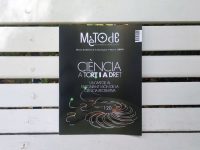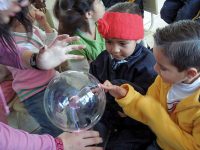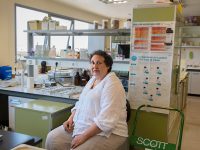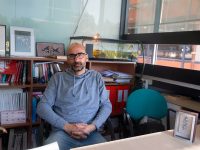José Luis Rubio: «To write science in the press, you have to make it compelling»
Founder and first director of the Desertification Research Centre (CIDE-CSIC)
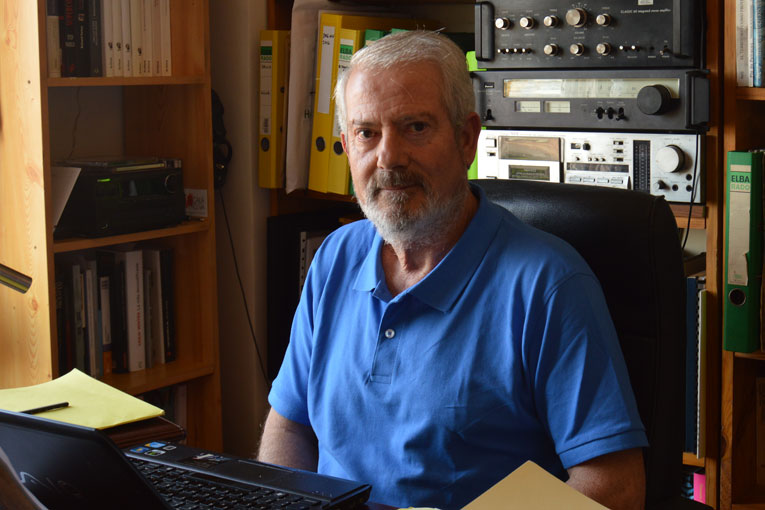

José Luis Rubio is the founder and first director of the Desertification Research Centre (CIDE-CSIC). His research work has been acknowledged many times with a number of awards such as the Jaume I Award for the Protection of the Environment in 1996. He recently published Pasión por la tierra. Crónicas de naturaleza y territorio. (A passion for the Earth. Chronicles of nature and territory), a collection of 94 opinion articles published by the scientist in the newspaper El Mundo. These articles, according to the author himself, offer two perspectives of nature: «One sensory and aesthetic that surrounds and stimulates us and another one that tries to understand and decipher what is hidden». We talked to him to learn more about his work as researcher and communicator.
You are the founder and first director of the Desertification Research Centre (CIDE-CSIC). What projects are you developing at the moment?
We are the only desertification centre in Mediterranean climate and we delve mainly into problems related to soil degradation processes: impact of wildfires, erosion, salinisation, pollution… In addition, we also study the restoration of degraded areas and of soil after a fire. In this sense, we establish guidelines for a more sustainable use of the territory, focusing on evaluation and planning. Besides, one of our groups works on the soil-vegetation interface, studying seed distribution and plant recolonisation, as well as the adaptation of Mediterranean species.
What is the purpose of these lines of research?
Fundamentally, the protection of the territory. The Mediterranean environment is very rich in biodiversity and biological potential, but also very fragile and vulnerable. We try to provide guidelines, information and knowledge to promote the resilience – response capacity – of the environment and try to alleviate the problems of desertification and climate change.
You have an educational background as an agricultural engineer. When did your communication vocation emerge?
Throughout my career I have focused mainly on aspects related to research, but also on management and scientific advice for national and international organisations. However, I have always tried to devote special attention to transmit to society an interest and amazement for our natural environment, as well as warning and raising awareness about threats to it. This educational vocation emerged from the desire to convey my fascination for the secrets, tricks and surprises of the mysterious world that surrounds us.
How would you assess your work as a columnist for El Mundo?
It was a difficult task at first because, conversely to scientific writing, this was aimed at a very broad public. Therefore, I could not be too general or too technical, because my explanations would turn out to be incomprehensible. My daughters were often the filter for these columns. They read them before they were published and gave their opinion. In addition, to write science in the press, you have to make it compelling for the reader. Altogether, I must say it was a difficult but very rewarding experience.

Writing for the press can be somewhat ephemeral, but the publication of Pasión por la tierra provides permanence to these columns and opens a broad range of dissemination possibilities so they can reach a wider and more varied audience.
What is your opinion on scientific communication?
There is an institutional problem with this topic: scientific evaluations do not only value dissemination work, but even penalise them. That is to say, popularisation efforts are not advertised. This is a handicap, because it pushes scientists to work only on the topics or activities for which he will be most valued. In any case, I decided that our environment has a very important story to tell, so narrating what happens and why it happens is a fascinating adventure.
Why are you so committed to the Mediterranean environment?
Our environment is the second richest natural environment in the planet in terms of biodiversity, but at the same time, as I said before, one of the most vulnerable. This irony is not very well known, and the impact of climate change in the last few decades identifies us as one of the most vulnerable areas. In general, there is a lack of perception and appreciation for our environment in Mediterranean culture, and I think the scientific community should raise awareness on this situation.
How do you think we will face climate change in the next years?
We do not have to think about climate change exclusively from a negative point of view, but also as an opportunity for improvement. An improvement in the model of energy efficiency, decreasing emissions, thinking about the use of territory, transport, eco-efficiency, water resources… All these activities are opportunities for innovation that can yield economic advancements and promote a richer and truly sustainable environment.
Lastly, what do you think about the commitment to science?
Unfortunately, in Spain we still do not have the tradition of scientific appreciation that the Anglo-Saxon world has. This is a serious problem because research is necessary in almost every aspect of life and society, as well as its translation into technological advancements that guarantee welfare and a good level of quality of life. In our country – with some remarkable exceptions – devoting your career to science is not very rewarding, and this is a very serious drawback for all environmental, economic and social aspects. Just to mention a specific topic, the evolution of climate change will require inventive solutions and an important technical capacity that is currently almost non-existent.
Marcos Morales Peláez. Biology student at the University of Valencia.
© Mètode 2016.

